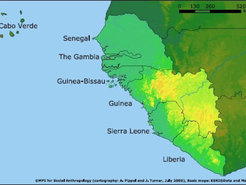Research Group: “Integration and Conflict along the Upper Guinea Coast (West Africa)”
Award
Research Focus

Our research aims at the comparison of processes of integration and conflict along the Upper Guinea Coast of West Africa. We look at integration and conflict as interrelated dimensions of social interaction in any given society that need to be studied as facets of the social dynamics in which they are embedded. We study integration and conflict as dimensions of social relationships and alliances, and in the context of the construction of identity and difference within society at large. We aim at a better understanding of the social mechanisms that affect integrative and violent forms of interaction at the different levels of Upper Guinea Coast societies.
The Upper Guinea Coast is particularly heterogeneous in terms of social and political structures, ethnic identities and languages spoken. Historically, the region’s societal makeup was affected by the many encounters between the different local groups and societies in the region, their interaction with the large empires of the Sahel region, as well as with the Europeans from the 16th century onwards. Besides them, different settler groups – liberated slaves of diverse backgrounds and people originating from the Middle East – have played a major role in shaping the region’s social and cultural configurations and the experience of the transatlantic slave trade and colonial domination have influenced the attitudes towards and interactions between “hosts” and “strangers” in particular ways.
Some of the countries in the Upper Guinea Coast region have been among the most violent regions in Africa in the recent past, others have experienced wide-spread political instability and recurrent outbursts of violence. However, Upper Guinea Coast societies have also known – and continue to experience – extended periods of integrative, rather than violent interaction. Socio-cultural institutions and complex mechanisms exist through which the incorporation of strangers, the integration of socio-cultural difference and the (re-)conciliation after conflict and crisis may be achieved. When studying integration and conflict, we must keep in mind that it is not a society’s “good” or “bad” traditions, values and structures as such that lead to either peaceful or violent interaction. Rather, the same traditions, values and structures within a society may have different outcomes at different times, depending on the historical, social, political, and economic context and dynamics of a given situation and setting.
Our research focusses on the social dynamics closely interrelated with processes of integration and conflict in the region, i.e.:
- Conceptualizations and practices of nation- and statehood under conditions of socio-economic crisis and inequality; post-war/post-conflict practices of nation-/statehood from “below”
- Conceptualizations and practices of nation- and statehood in contexts of ethnic diversity; the relationship between ethnic and national identities; the interaction of ethnic, local and national identifications among different social actors and groups
- The role of settler/creole groups in interethnic relations, postcolonial nation-building and (re-)constructions of nation- and statehood; creole representations and identities in processes of integration and conflict in contexts of ethnic diversity
- Traditional and local leadership vis-à-vis the nation-state’s institutions and (I)NGOs; their interactions and impact on political discourses and practices on local, (trans-)national and regional levels
- Contestations and interactions of different models and practices of “gender” and “generation”; their impact on social configurations and practices beyond “gender” and “generation”
- The social and political effects of out-migration on Upper Guinea Coast societies; the role of transnational and diasporic relations and interactions on social and political configurations and practices on local, (trans-)national and regional levels; processes of identification and discourses of integration in contexts of prolonged humanitarian assistance of asylum seekers
- The role of oral histories, experiential knowledge, formal education and religious beliefs in processes of inclusion, exclusion and differentiation
- The discourses concerning origin and descent and their impact on intergroup relations, identity constructions and ethnic representations vis-à-vis the nation-state, NGOs and international (political) actors; autochthony discourses in interethnic relations and current (re-)constructions of nationhood
- The unfolding and ending of crisis, normality and exception; the production of crisis by local, national and international dynamics and actors; the social and political effects of the Ebola crisis on social relations
